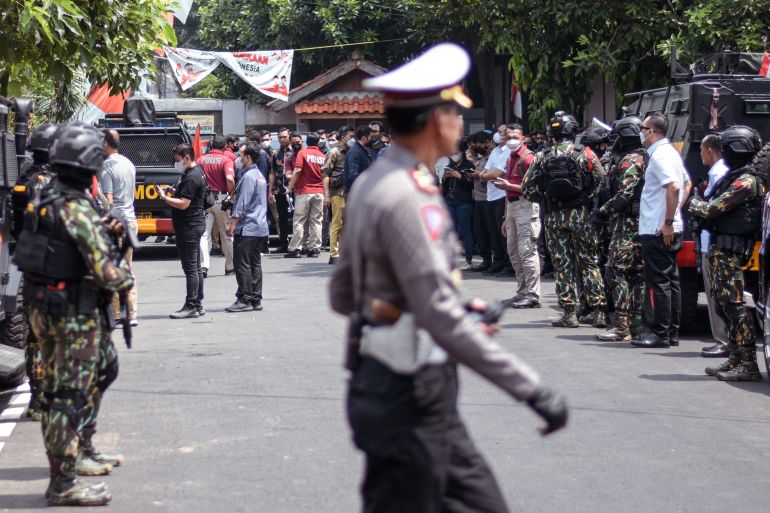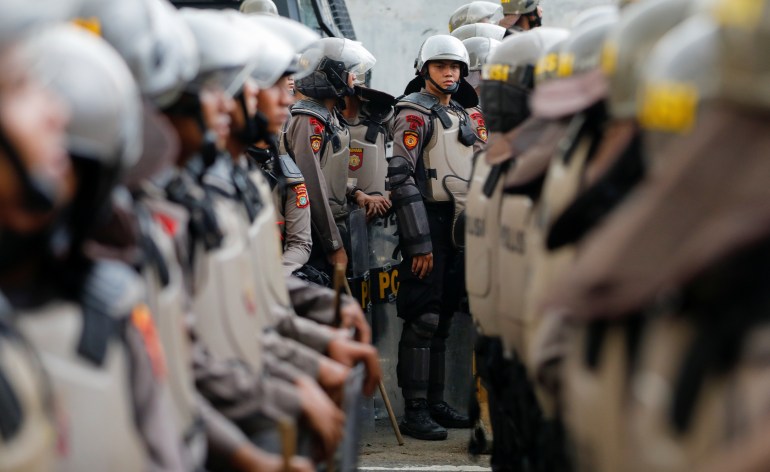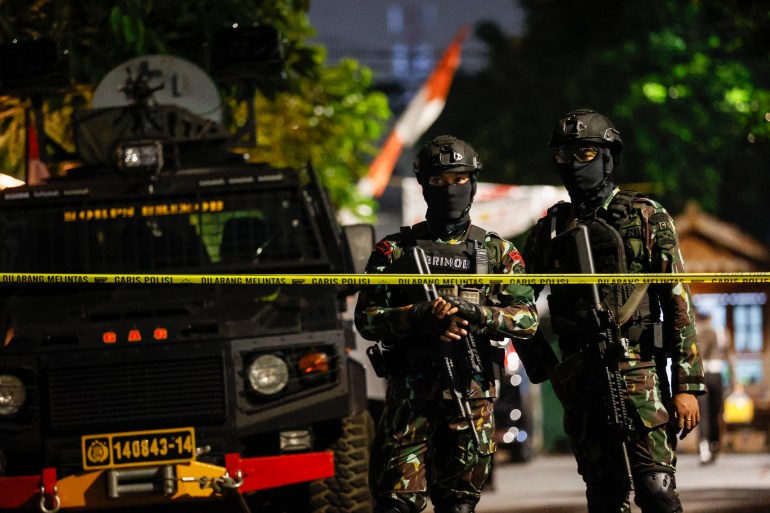Indonesian police on trial in lurid murder of general’s bodyguard
Public trust in police shaken after top police general and his wife arrested for fatal shooting of his bodyguard.

Medan, Indonesia – The arrest of a two-star general on suspicion of the murder of his bodyguard has riveted Indonesians in a case that threatens to undermine public confidence in a police force that has been undergoing reform since the end of strongman Soeharto’s rule more than 20 years ago.
Brigadier Nopryansyah Yosua Hutabarat known as Brigadier J, the bodyguard and driver of Inspector General Ferdy Sambo, the head of Internal Affairs for the Indonesian National Police, was found dead at Sambo’s home in Jakarta on July 8.
Keep reading
list of 4 itemsAustralia PM says reduction of Bali bomber’s sentence upsetting
Xi and Putin confirmed for November’s G20 summit in Bali
Indonesia’s Widodo hails ‘strong’ economy, rising global profile
The 27-year-old had been shot multiple times.
Initially, police told the public that Hutabarat had been killed at Sambo’s home by another member of his security detail known as Second Patrolman E who had allegedly shot Hutabarat after catching him sexually assaulting Sambo’s wife Putri Candrawati.
Sambo, whose job focussed on internal police discipline, at first said that he was taking a PCR test for COVID-19 at the time of the shooting, but in the days that followed, conflicting information emerged of affairs, cover-ups and nefarious business practices.
On August 9, he was arrested and named a suspect in the premeditated murder of Hutabarat. Ten days later, Sambo’s wife was also picked up on suspicion of premeditated murder, and helping him cover up the killing of Hutabarat.
If found guilty, Sambo could face the death penalty or life in prison. Police have not explained why they detained Putri Candrawati.
The head of Amnesty Indonesia, Usman Hamid, told Al Jazeera that the case raised grave concerns.
“It‘s an unlawful and extrajudicial killing that was manipulated by the police as a lawful killing. If they could do it to a policeman, how about regular citizens killed by the police?” he said.
“The investigation into Joshua’s murder [Hutabarat] has been protracted and full of irregularities because of the weak democratic oversight of the police.”
Twists and turns
Hutabarat’s killing was not made public until July 11, and was followed by protests from his family who said they had been told not to open his coffin when his remains were returned to his hometown for burial. Ignoring the directive, relatives said they were shocked to discover evidence of torture on Hutabarat’s body after they looked inside the coffin.
Speaking to Al Jazeera, the family’s lawyer Kamaruddin Simanjuntak said that the family had pushed for Hutabarat’s body to be exhumed at the end of July and for a second autopsy. The results had been shocking, the lawyer said.
“He had been shot five times in the face, head, neck and foot, and there were signs of torture on his body,” Simanjuntak said. “He had wounds on his face, bruises to both sides of his chest, his fingers were broken and he could not straighten his left leg.”
Simanjuntak says during the second autopsy, Hutabarat’s brain was found in his chest cavity, and that he suspected that the doctors who had performed the first autopsy at the behest of the police had neglected to return it to his skull. The victim’s bladder, pancreas and gallbladder were also missing, he added.

The twists and turns of the case, reminiscent of a soap opera, have transfixed Indonesia.
Police initially said that the security camera system around Sambo’s home had been hit by lightning and was not working at the time of the killing.
Reliant on witnesses, they said that Hutabarat had been engaged in a firefight with a 24-year-old junior officer, Richard Eliezer Pudihang Lumliu, during which he had fired seven shots at Eliezer but had failed to hit him, something which his family said was implausible since Hutabarat was a trained sniper while Eliezer was a low-ranking policeman.
Later, police said they had managed to find some footage, but their big break came when Eliezer was taken into custody on August 4 and told police that 49-year-old Sambo had ordered him to shoot Hutabarat, and that Sambo had fired Hutabarat’s gun at the wall to make it appear as if there had been a firefight. He has since applied for assistance under Indonesia’s Witness Protection Programme and seems to have reached a deal with prosecutors.
Jacqui Baker, a lecturer in Southeast Asian politics at Murdoch University in the Australian city of Perth, says the scandal raises questions about the process of largely self-determined institutional reform that the Indonesian police (Polri) have been engaged in since the end of President Soeharto’s rule in 1998.
“That reform promised more democratic and professional policing that truly served the community. 24 years on, where are we at with the Polri’s democratic reform? The core issues of systematic corruption, egregious entitlement and brutal violence have survived over two decades,” she said.
During the Soeharto regime, which lasted for 30 years, Indonesia’s police force had a reputation for corruption and cronyism. Subsequent administrations have sought to reform law enforcement and make the force more accountable.
“We were told that between presidential oversight, the parliament and the National Police Commission (Kompolnas), the police institution would be effectively scrutinised,” Baker said, adding however that this scandal appears to have shown that any reform has been ineffective.
“I think we need to go back to the drawing board to reconsider how the police are established, trained, governed and how oversight is maintained because this scandal shows us that corruption and political factionalism continue to loom large within the police institution,” she said.
Public trust
While the developments in the case have played out like an Indonesian soap opera at times, the public has become increasingly scandalised by the purported cover-up of the killing in the early days and the apparent arrogance of the police force.
More than 80 officers from different branches of the police, including internal affairs and staff from Jakarta’s police headquarters, have been questioned about any potential cover-up as a result of the incident.
Some have been transferred to other positions and others recommended for custodial sentences, leading to Sugeng Teguh Santoso, the chairman of Indonesia Police Watch calling the saga, “the worst scandal in the police’s history”.
Sambo faced an ethics committee last week, which dishonourably discharged him from the force, although he had tendered his resignation the day before. He now says that he plans to appeal against the ruling.
Indonesian President Joko Widodo, popularly known as Jokowi, has also commented on the case, calling for a thorough investigation.
“Open it as it is. No cover-up. Transparent. That’s it. This is important so that the people don’t have doubts over the incident that occurred. This is what has to be maintained. Public trust in the police must be maintained,” he said on the day Sambo was arrested and charged.

Muhamad Isnur, the head of Indonesia’s Legal Aid Institute, says the case shows how violence is increasingly normalised and even tolerated by the police.
“We know that violence during police interrogations and in custody is common. Sambo is just the tip of the iceberg,” he said. “There is also a structural problem in the police force which asks how could someone like Sambo condition so many of his subordinates to cover this up?”
Isnur also says there should be a full investigation into whether Sambo was involved in other illicit activities — Indonesian media have published lurid reports about supposed online gambling — and closer scrutiny of how corruption spreads through the force.
“How did he influence so many officers from different departments, not just in from his own department, but also staff at the Jakarta police headquarters and others who all acquiesced to him,” he said.
“This structure has to be fixed immediately.”
Lawyer Simanjuntak told Al Jazeera that, in his opinion, Hutabarat had been killed because he possessed “top secret” information about Sambo that the former general wanted to remain hidden.
The police have not officially commented on the motive for the murder, and Simanjuntak says the case will now be passed to the public prosecutor.
Sambo is due to face trial in the coming weeks, but in the court of public opinion the police have already been found wanting.